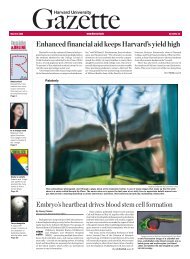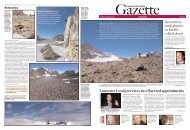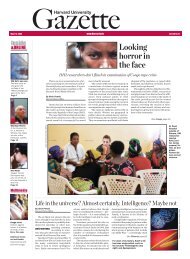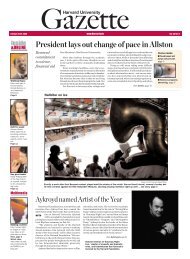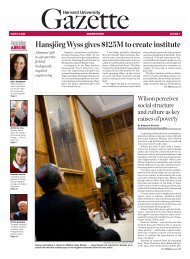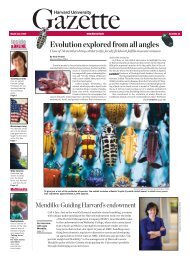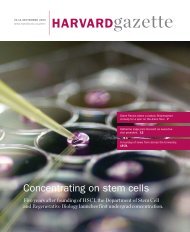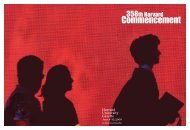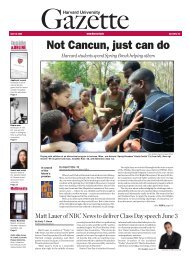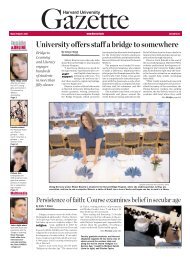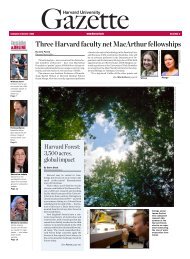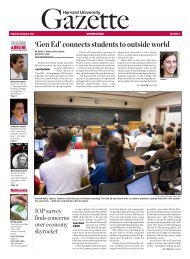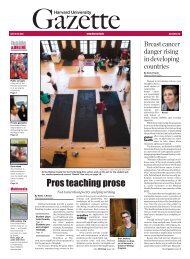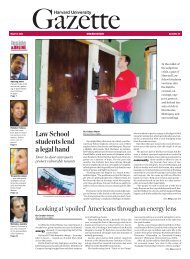Harvard University Gazette December 4-10, 2008 - Harvard News ...
Harvard University Gazette December 4-10, 2008 - Harvard News ...
Harvard University Gazette December 4-10, 2008 - Harvard News ...
You also want an ePaper? Increase the reach of your titles
YUMPU automatically turns print PDFs into web optimized ePapers that Google loves.
22/ <strong>Harvard</strong> <strong>University</strong> <strong>Gazette</strong> <strong>December</strong> 4-<strong>10</strong>, <strong>2008</strong><br />
Poetry<br />
Gwyneth Lewis<br />
told her Radcliffe<br />
Gymnasium<br />
audience<br />
that writing, as<br />
an art and practice,<br />
is ‘at the<br />
center of my<br />
well-being. The<br />
process of poetical<br />
composition<br />
itself is a powerful<br />
force for<br />
health.’<br />
A videotape of<br />
Lewis’ lecture<br />
will be available<br />
within two<br />
weeks at<br />
www.radcliffe.<br />
edu/events/<br />
calendar_<br />
<strong>2008</strong>lewis.aspx.<br />
Rose Lincoln/<strong>Harvard</strong> <strong>News</strong> Office<br />
(Continued from previous page)<br />
sion. “Unwritten poems,” said Lewis, “are a force<br />
to be feared.”<br />
Poets are a force like that, too. Unlike the “fluffy”<br />
image they sometimes engender in the popular<br />
imagination, said Lewis, poets “inhabit difficult<br />
emotional terrain.” She quoted Dylan Thomas, who<br />
said that being a poet was like “walking over broken<br />
glass with your eyeballs.”<br />
Thomas was among the modern poetic inspirations<br />
Lewis mentioned, along with Wallace<br />
Stevens. But for her epic poem, she found herself<br />
reaching further back — to Virgil, whose “Aeneid”<br />
she had once “tinkered with” in studying Latin; to<br />
Milton; and to Shakespeare, whose blank verse<br />
supplied “the most muscular shoulders of all.”<br />
Lewis used passages from her long poem to illustrate<br />
the conventions of the epic, including the<br />
requisite journey into the underworld (in this case,<br />
a hospital basement).<br />
She also uses metaphorical journeys into science<br />
and medicine to give the poem its energy — for<br />
which she thanked another inspiration, the 15th<br />
century French poet François Villon. He wrote<br />
with a colloquial directness, said Lewis, and with<br />
complete frankness about the body.<br />
Lewis is a polymath. She is a writer steeped in<br />
the tradition of two languages — her “double life,”<br />
as she wrote in the preface to “Keeping Mum: Voices<br />
from Therapy” (Bloodaxe, 2003). “I swear in ancient<br />
Brythonic idioms … and surf the Net using the<br />
language of the Saxons.”<br />
Lewis is also a writer who has explored how science<br />
and art illuminate one another, making her<br />
the perfect resident of the Radcliffe Institute for<br />
Advanced Study, an intellectual commons where<br />
the mission is the interdisciplinary penetration of<br />
intellectual borders.<br />
Her writing draws on medicine, astronomy, psychiatry,<br />
and architecture. Her sailing and marriage<br />
memoir, “Two in a Boat” (Fourth Estate, 2005), was<br />
not only an “Odyssey”-like portrait of the wedded<br />
pair as “Sea Bitch” and “Captain Bastard.” It was<br />
full of technical drawings, and talk of hitches, hulls,<br />
splices, decks, and depressions of the weather variety.<br />
At <strong>Harvard</strong>, Lewis is auditing a course on the<br />
neurobiology of language acquisition. Her lecture<br />
connected good health to the heartbeat of iambs,<br />
trochees, and metaphors that enliven poetry.<br />
“Language itself,” said Lewis, “may be the<br />
world’s first mind-altering substance.”<br />
corydon_ireland@harvard.edu<br />
Japan<br />
(Continued from previous page)<br />
ucation as a right.<br />
Public comments were solicited, and<br />
more than 13,000 communications were received.<br />
But some of the outspoken proponents<br />
of the government’s revisions turned<br />
out to be sakura — paid stooges, hired to<br />
mouth the government’s position.<br />
Opposition parties chastised government<br />
for rigging its own “town meetings”<br />
and expressed skepticism that the revisions<br />
would solve problems. The revisions were<br />
called “a naked attempt to push patriotism<br />
on the people,” Hardacre said.<br />
But they went through. As did another<br />
important change: a lifting of the ban on<br />
school field trips to the Yasukuni Shrine, the<br />
final resting place of 14 Class A war criminals.<br />
As prime minister, Junichiro Koizumi<br />
made annual visits there, to the distress of<br />
Japan’s neighbors.<br />
‘Salami slicing’ the constitution<br />
Another panelist, Richard J. Samuels,<br />
Ford International Professor of Political<br />
Science at the Massachusetts Institute of<br />
Technology, brought out in his presentation<br />
how much change in Japanese defense policy<br />
has been possible without constitutional<br />
change — a “salami slicing” approach like<br />
that taken by Germany at the end of the Cold<br />
War, when geopolitical realities had<br />
changed.<br />
In response to a question from the floor<br />
as to whether the current constitution is out<br />
Nick Welles/<strong>Harvard</strong> <strong>News</strong> Office<br />
Timothy George (from left), Helen Hardacre, and Richard Samuels each provided a different<br />
vantage from which to explore the many questions surrounding the Japanese constitution.<br />
of sync with reality, Samuel, who stressed<br />
that it wasn’t an issue on which he as an<br />
American had a vote, responded, “If I were<br />
Japanese I would be in favor of at least a<br />
reinterpretation of Article 9 to allow for<br />
Japanese participation in collective self-defense.”<br />
He added, “From an American perspective,<br />
it would be a good thing to have a<br />
change.” Legal changes that would let Japan<br />
shoulder more of the defense burden<br />
“would be good for the alliance,” he said.<br />
“There’s something to be said for honesty,<br />
for a fundamental belief in the robustness<br />
of Japanese democracy,” he added.<br />
“The belief that the Japanese can’t trust<br />
themselves with weapons … is archaic and<br />
dangerous.”<br />
The symposium was part of Constitutional<br />
Revision in Japan, a research project<br />
of the Reischauer Institute. The<br />
moderator was Susan J. Pharr, Edwin<br />
O. Reischauer Professor of Japanese<br />
Politics and the director of the Program<br />
on U.S.-Japan Relations as well<br />
as director of the Reischauer Institute.<br />
Since the mid-1990s, calls for constitutional<br />
revision have been on the<br />
upswing, with major political parties,<br />
news organizations, and civil society<br />
groups all making proposals for<br />
changes, and in many cases offering<br />
complete drafts for a revised constitution.<br />
There are many issues that<br />
reformers of various stripes would<br />
like to see addressed in a prospective<br />
revision. But, overwhelmingly, the<br />
most important one is Article 9.<br />
And as Pharr noted, constitutionalism<br />
is not only of interest and importance<br />
per se; it also “has provided<br />
a lens for looking at a whole range of<br />
issues” within Japanese studies.<br />
The Constitutional Revision project<br />
in Japan has become a model of Web research.<br />
Because so much of the current constitutional<br />
debate in Japan is conducted online,<br />
it’s been wide-ranging, inclusive, and<br />
accessible. But insofar as Web pages tend<br />
not to leave the same kind of trail for scholars<br />
as records on paper, the Reischauer Institute<br />
project has pioneered use of “Web<br />
harvesting” software to capture and store<br />
the output of some 80 Web sites in Japan.



